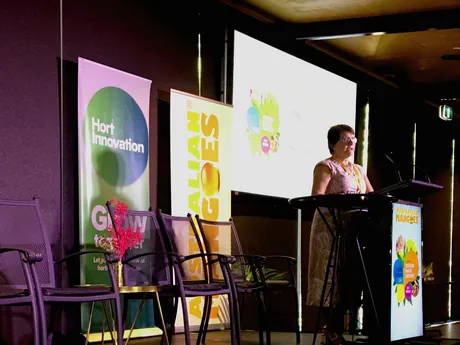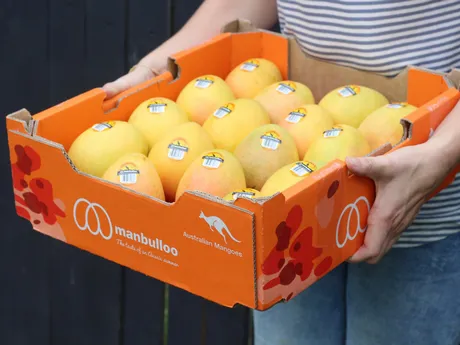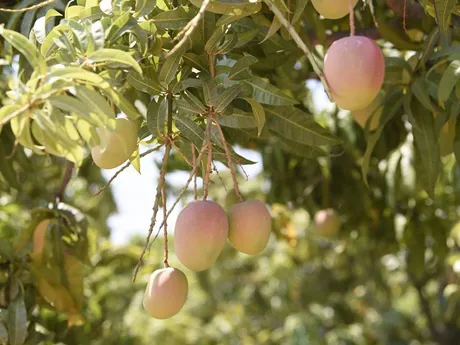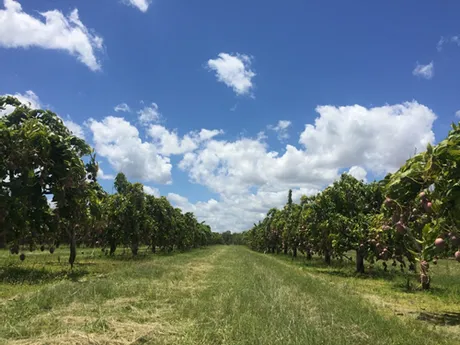One of the key lessons that Manbulloo has learnt over the past 12 years that it has been exporting is that Australian mangoes need to have superior flavour and appearance to be competitive.
Managing Director Marie Piccone shared her company's story at the 12th Australian Mango Conference in Darwin, and says that the fruit is a high-value product, and that Australian growers will not be able to compete on price in the global market.
"When we started in Korea, we were the most expensive product that they imported," Ms Piccone said. "So for them to actually market that we needed to have unique points of difference. What they identified to us were the unique points of difference were all about flavour, and the eating experience. That emotional, happy-memory experience, which had to be a great valuable experience. Another example, I attended a national mango board meeting in the United States last year. All the Central and South American growers were talking about their average price received out of the U.S was US$5 per case. They're smaller than ours, about 4 kilos (per piece), but we command in the US$30s (per tray). To command that, we need to have a unique selling difference."

Ms Piccone purchased Manbulloo in 2005, which had three "rundown plantations". So, she says the fist five-year business plan was getting the orchards back to having quality fruit in commercial volumes, as well as the efficiency to ensure the break-even price was acceptable to industry standards. From early on, Manbulloo knew there were also export opportunities, and began receiving interest from Asia, Europe and New Zealand, who had been getting small volumes the product via wholesale floors.
"We needed to know where our product was being exported, and needed to take more ownership and work more collaboratively in the supply chain to actually get product into export markets and meet the needs of consumers," she said. "By 2007 we had embarked on an export plan; some of that was through existing operating exporters and some of that was on our own, depending on the market and depending on the supply chain."

At the same time the Queensland Department of Primary Industries were working on an Asian market export project - and mangoes were one of the products.
"It was working in collaboration with the Northern Territory Department of Primary Industries and Fisheries, and the decision had to be made, do we jump on board with this with a whole heap of technical, promotional and market support, or hang around for our own plan," Ms Piccone said. "We decided to jump on and it is probably one of the best things that we ever did because it was a highly successful project from our perspective. One of the key objectives was to increase export volume, but it has certainly supported us well in our start to develop export markets."
In addition to the new overseas opportunities, Manbulloo was also expanding supply in Australian market, and strengthening its relationship with supermarket Coles. Ms Piccone says it was able to align values by working closely with retail partner, and that also provided the perfect example to build relationships with export markets.
"We had to find a synergy between the Australian market and export," she said. "I often liken it to feeding the dragon, because when you are working with partners (domestically and internationally) you have to make sure that they are happy. That can often be a balancing act, but there were lots of learnings in that."

Manbulloo found was that some international customers did not know how to handle mangoes. So, the company has since made a "tremendous effort" to build knowledge in supply chain, to get the product to consumers in optimal condition. Sometimes that means realising that all markets are different, and while it supplied 16 export markets at one stage, Ms Piccone says there is now smaller number of specific target markets, to concentrate on maintaining strong performance.
"There are never going to be super profits in export markets," she explained. "They are part of the mix of the overall market strategy. So, returns and pricing are variable in relation to the Australian market. Sometimes you are investing to keep product in the Australian market, but more often than not, especially at the beginning of the season, you are investing to keep supply to export partners. It has got to be very much a longer-term strategy, rather than a transactional one, or: 'which one has the highest price this week?'. I genuinely believe that a well-integrated, well thought-out marketing strategy, encompassing both, is a good risk management business practice."

But at the end of the day, Ms Piccone admits that there is no better feeling than to see Australian fruit succeeding on the international stage.
"Meeting export requirements is never easy, but it certainly is rewarding if you get it right and select the right markets," she said. "When you see lots and lots of people in Seoul picking up a double pack of your mangoes in Costco, and every third trolley has got mangoes in it - that is a really rewarding experience. Especially when you realise you are finally making some money out of it."
.jpg?preset=ContentCustom) For more information:
For more information:
Marie Piccone
Manbulloo Ltd
Phone: + 61 8 8972 2590
reception@manbulloo.com
www.manbulloo.com
